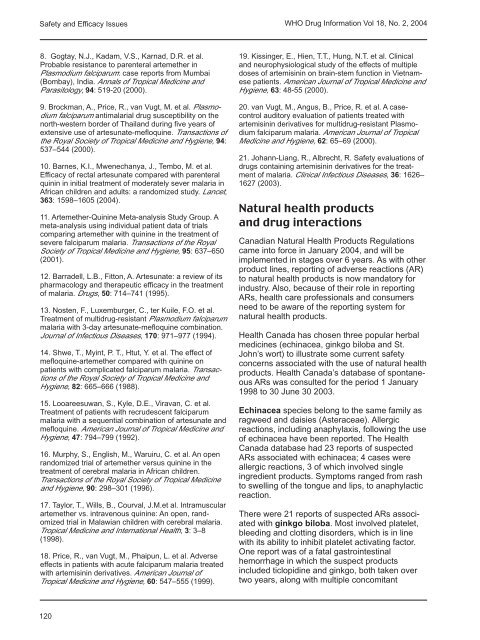WHO Drug Information Vol. 18, No. 2, 2004 - World Health ...
WHO Drug Information Vol. 18, No. 2, 2004 - World Health ...
WHO Drug Information Vol. 18, No. 2, 2004 - World Health ...
Create successful ePaper yourself
Turn your PDF publications into a flip-book with our unique Google optimized e-Paper software.
Safety and Efficacy Issues<br />
8. Gogtay, N.J., Kadam, V.S., Karnad, D.R. et al.<br />
Probable resistance to parenteral artemether in<br />
Plasmodium falciparum: case reports from Mumbai<br />
(Bombay), India. Annals of Tropical Medicine and<br />
Parasitology, 94: 519-20 (2000).<br />
9. Brockman, A., Price, R., van Vugt, M. et al. Plasmodium<br />
falciparum antimalarial drug susceptibility on the<br />
north-western border of Thailand during five years of<br />
extensive use of artesunate-mefloquine. Transactions of<br />
the Royal Society of Tropical Medicine and Hygiene, 94:<br />
537–544 (2000).<br />
10. Barnes, K.I., Mwenechanya, J., Tembo, M. et al.<br />
Efficacy of rectal artesunate compared with parenteral<br />
quinin in initial treatment of moderately sever malaria in<br />
African children and adults: a randomized study. Lancet,<br />
363: 1598–1605 (<strong>2004</strong>).<br />
11. Artemether-Quinine Meta-analysis Study Group. A<br />
meta-analysis using individual patient data of trials<br />
comparing artemether with quinine in the treatment of<br />
severe falciparum malaria. Transactions of the Royal<br />
Society of Tropical Medicine and Hygiene, 95: 637–650<br />
(2001).<br />
12. Barradell, L.B., Fitton, A. Artesunate: a review of its<br />
pharmacology and therapeutic efficacy in the treatment<br />
of malaria. <strong>Drug</strong>s, 50: 714–741 (1995).<br />
13. <strong>No</strong>sten, F., Luxemburger, C., ter Kuile, F.O. et al.<br />
Treatment of multidrug-resistant Plasmodium falciparum<br />
malaria with 3-day artesunate-mefloquine combination.<br />
Journal of Infectious Diseases, 170: 971–977 (1994).<br />
14. Shwe, T., Myint, P. T., Htut, Y. et al. The effect of<br />
mefloquine-artemether compared with quinine on<br />
patients with complicated falciparum malaria. Transactions<br />
of the Royal Society of Tropical Medicine and<br />
Hygiene, 82: 665–666 (1988).<br />
15. Looareesuwan, S., Kyle, D.E., Viravan, C. et al.<br />
Treatment of patients with recrudescent falciparum<br />
malaria with a sequential combination of artesunate and<br />
mefloquine. American Journal of Tropical Medicine and<br />
Hygiene, 47: 794–799 (1992).<br />
16. Murphy, S., English, M., Waruiru, C. et al. An open<br />
randomized trial of artemether versus quinine in the<br />
treatment of cerebral malaria in African children.<br />
Transactions of the Royal Society of Tropical Medicine<br />
and Hygiene, 90: 298–301 (1996).<br />
17. Taylor, T., Wills, B., Courval, J.M.et al. Intramuscular<br />
artemether vs. intravenous quinine: An open, randomized<br />
trial in Malawian children with cerebral malaria.<br />
Tropical Medicine and International <strong>Health</strong>, 3: 3–8<br />
(1998).<br />
<strong>18</strong>. Price, R., van Vugt, M., Phaipun, L. et al. Adverse<br />
effects in patients with acute falciparum malaria treated<br />
with artemisinin derivatives. American Journal of<br />
Tropical Medicine and Hygiene, 60: 547–555 (1999).<br />
120<br />
<strong>WHO</strong> <strong>Drug</strong> <strong>Information</strong> <strong>Vol</strong> <strong>18</strong>, <strong>No</strong>. 2, <strong>2004</strong><br />
19. Kissinger, E., Hien, T.T., Hung, N.T. et al. Clinical<br />
and neurophysiological study of the effects of multiple<br />
doses of artemisinin on brain-stem function in Vietnamese<br />
patients. American Journal of Tropical Medicine and<br />
Hygiene, 63: 48-55 (2000).<br />
20. van Vugt, M., Angus, B., Price, R. et al. A casecontrol<br />
auditory evaluation of patients treated with<br />
artemisinin derivatives for multidrug-resistant Plasmodium<br />
falciparum malaria. American Journal of Tropical<br />
Medicine and Hygiene, 62: 65–69 (2000).<br />
21. Johann-Liang, R., Albrecht, R. Safety evaluations of<br />
drugs containing artemisinin derivatives for the treatment<br />
of malaria. Clinical Infectious Diseases, 36: 1626–<br />
1627 (2003).<br />
Natural health products<br />
and drug interactions<br />
Canadian Natural <strong>Health</strong> Products Regulations<br />
came into force in January <strong>2004</strong>, and will be<br />
implemented in stages over 6 years. As with other<br />
product lines, reporting of adverse reactions (AR)<br />
to natural health products is now mandatory for<br />
industry. Also, because of their role in reporting<br />
ARs, health care professionals and consumers<br />
need to be aware of the reporting system for<br />
natural health products.<br />
<strong>Health</strong> Canada has chosen three popular herbal<br />
medicines (echinacea, ginkgo biloba and St.<br />
John’s wort) to illustrate some current safety<br />
concerns associated with the use of natural health<br />
products. <strong>Health</strong> Canada’s database of spontaneous<br />
ARs was consulted for the period 1 January<br />
1998 to 30 June 30 2003.<br />
Echinacea species belong to the same family as<br />
ragweed and daisies (Asteraceae). Allergic<br />
reactions, including anaphylaxis, following the use<br />
of echinacea have been reported. The <strong>Health</strong><br />
Canada database had 23 reports of suspected<br />
ARs associated with echinacea; 4 cases were<br />
allergic reactions, 3 of which involved single<br />
ingredient products. Symptoms ranged from rash<br />
to swelling of the tongue and lips, to anaphylactic<br />
reaction.<br />
There were 21 reports of suspected ARs associated<br />
with ginkgo biloba. Most involved platelet,<br />
bleeding and clotting disorders, which is in line<br />
with its ability to inhibit platelet activating factor.<br />
One report was of a fatal gastrointestinal<br />
hemorrhage in which the suspect products<br />
included ticlopidine and ginkgo, both taken over<br />
two years, along with multiple concomitant

















